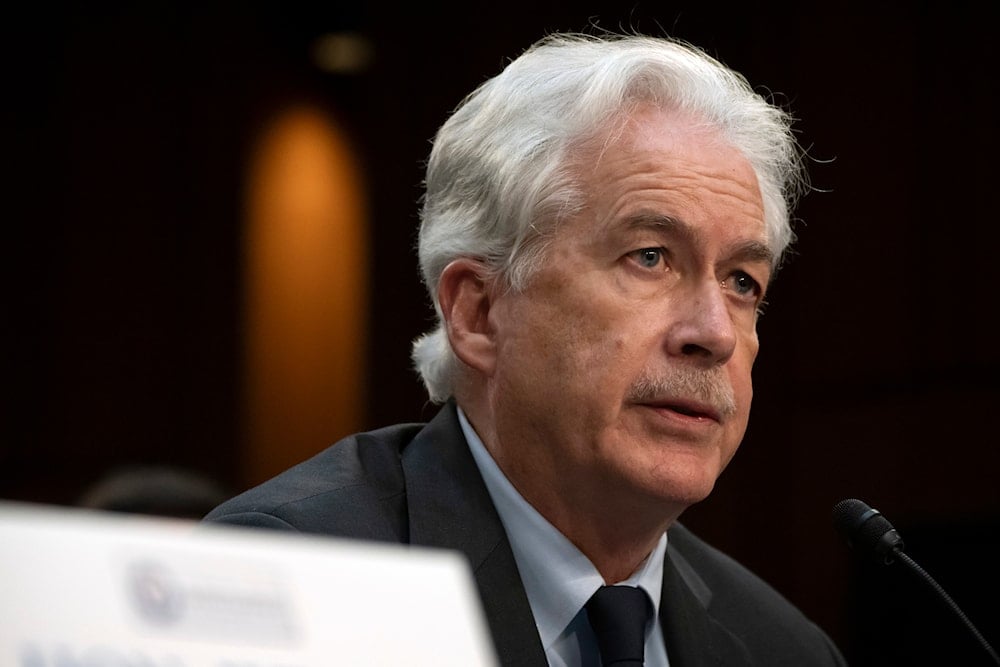US-Israelis-Egypt agree on necessity to close Philadelphia axis: Axios
The director of the CIA continues his rounds of talks with regional officials as the Biden administration scrambles for a ceasefire in Gaza without all-out calling for one.
-

CIA director William Burns speaks during a hearing of the Senate Intelligence Committee on Capitol Hill, March 11, 2024, in Washington, DC, the United States (AP)
CIA Director Bill Burns met with senior officials from Qatar, Egypt, and the Israeli occupation in Doha on Wednesday to address and finalize the remaining issues in the Gaza captive release and ceasefire deal. This crucial step aims to pave the way for detailed negotiations, Israeli journalist Barak Ravid wrote in Axios, citing sources familiar with the discussions.
There is growing optimism among Israeli and US officials about the possibility of reaching a deal, especially as the White House is exerting pressure on all involved parties to finalize the agreement, which could potentially secure the release of 120 captives and bring an end to the nine-month-long war of attrition on Gaza.
According to two Israeli officials, "Israel", Egypt, and the United States, all agree that it is necessary to close the Philadelphia Corridor on the border between Egypt and Gaza to stop weapons from being allegedly "smuggled to Hamas through underground tunnels."
The U.S. demonstrated a strong desire, according to Israeli officials, to actively participate in the construction of border infrastructure, including an underground "wall" that can detect attempts to dig tunnels and destroy them instantly.
At a minimum, the deal could lead to a 42-day pause in hostilities and the release of some captives, including American citizens.
One of the primary unresolved issues is Hamas' demand for written commitments from the US, Egypt, and Qatar to continue negotiations for the second phase of the deal without a time limit while the first phase is implemented.
Israeli and US officials believe this matter can be resolved during the current talks in Doha, allowing for detailed negotiations on the deal's implementation to proceed.
Other unresolved issues include the timeline for the redeployment of the Israeli occupation forces in Gaza, the identity and sequence of Palestinian prisoners to be released from Israeli prisons, and whether the Israeli occupation will have the right to veto the release of certain detainees.
Israeli intransigence
Burns arrived in Doha on Tuesday after discussions in Cairo with Egyptian President Abdul Fattah al-Sisi and a trilateral meeting with senior Egyptian and Israeli security officials.
He later met with Qatari Prime Minister Mohammed Bin Abdul Rahman al-Thani, a key mediator between Hamas and the Israeli occupation. On Wednesday, Burns held a joint meeting with the Qatari Prime Minister, the director of the Israeli Mossad, and the director of Egyptian intelligence.
Simultaneously, Biden's top Middle East adviser, Brett McGurk, met with Israeli Prime Minister Benjamin Netanyahu and Security Minister Yoav Gallant in occupied Palestine.
Netanyahu expressed his commitment to a captive and ceasefire deal, provided the Israeli occupation's key conditions are met. Gallant emphasized the importance of seizing this opportunity to secure the return of captives held by Hamas and stressed the need to establish mechanisms to prevent arms smuggling into Gaza.
He also indicated the Israeli occupation's support for reopening the Rafah crossing, provided Hamas is not involved in its governance.
Optimistic much?
The optimism regarding the ceasefire talks comes despite new conditions laid out by Netanyahu, which are expected to potentially hamper the talks and any progress within them.
The Washington Post published an op-ed on Monday suggesting that the latest conditions laid out by Netanyahu's office for a potential ceasefire in Gaza could stall negotiations and prevent any deal from occurring altogether.
According to the report, "Israeli Prime Minister Benjamin Netanyahu injected new uncertainty into the negotiations," by insisting that "Israel" must retain the option to resume its aggression on Gaza as part of any agreement accepted by negotiators.
The report notes that his statement "appeared to raise the bar" for what "Israel" would agree to in a deal, and further dampened hopes for an imminent peace.
On Sunday, Netanyahu stipulated that "any deal will allow Israel to resume fighting until all of the objectives of the war have been achieved." A statement released from his office indicated that the prime minister would not be ready to fully endorse a permanent ceasefire until the Palestinian Resistance in Gaza is completely eliminated.
The report mentioned criticism on the part of the opposition as well as from captives' families who argue that his conditions are posing a serious hurdle to peace talks, while opposition leader Yair Lapid labeled Netanyahu's statement as "provocative messages."
On July 6, Reuters reported, citing a senior Hamas source, that the movement accepted a US proposal to begin talks on releasing Israeli captives, including soldiers and men, 16 days after the first phase of an agreement aimed at ending the Gaza war.
The Palestinian Resistance group withdrew its demand for "Israel" to commit to a permanent ceasefire before signing the agreement. Instead, it will allow negotiations to work toward this goal during an initial six-week phase, as reported to Reuters by an anonymous source due to the private nature of the talks.
Two days prior, Hamas representative in Lebanon Ahmad Abdul Hadi told Al Mayadeen that the Resistance "will continue to battle [the Israeli occupation] if no agreement is reached."

 5 Min Read
5 Min Read








